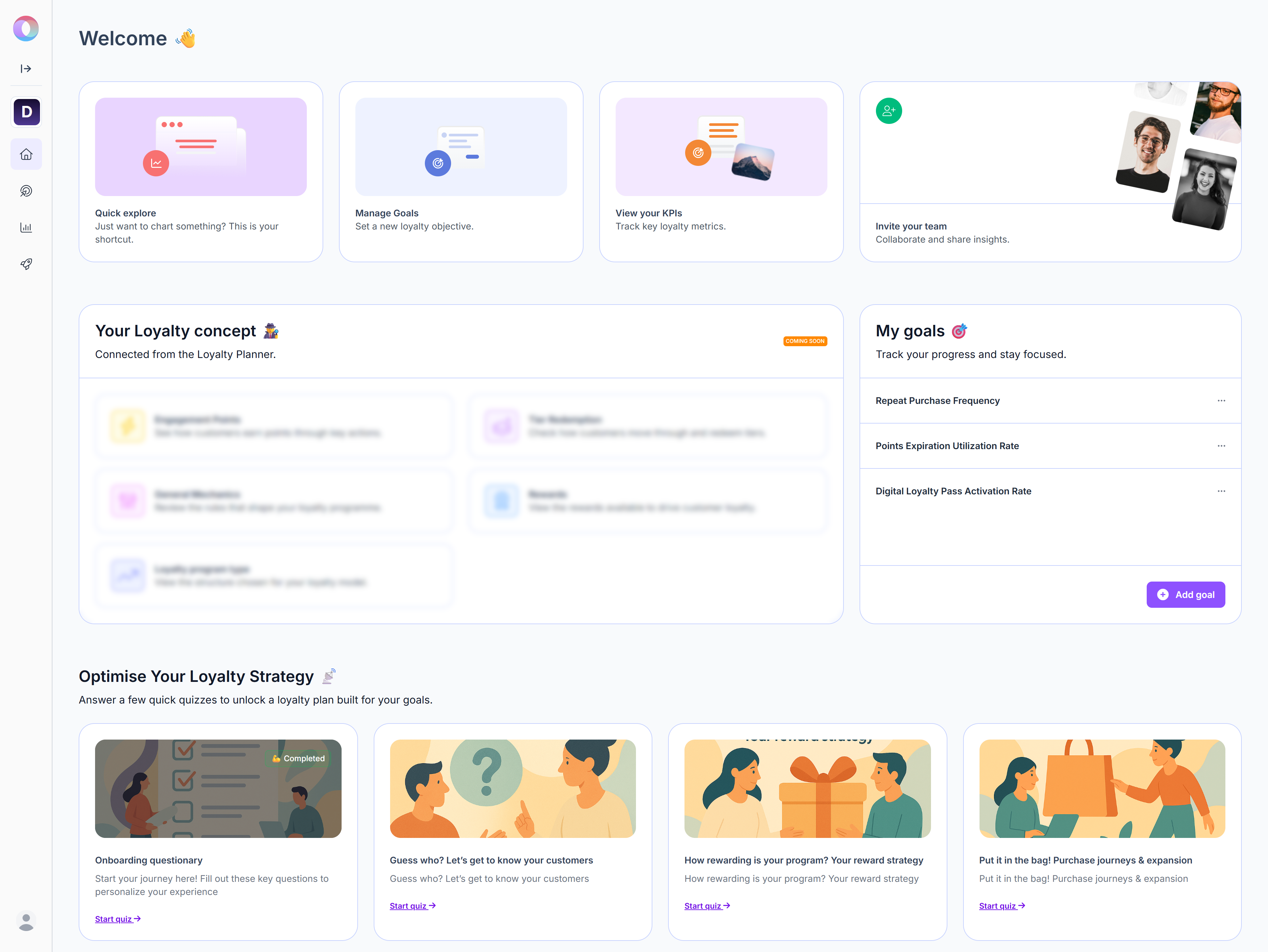When you first open Optimizer, you arrive in your workspace, which is directly connected to your Loyalty Engine database. This connection is prepared for you, so you can immediately start working with your own loyalty data. There’s no need for additional setup, every chart, goal, or analysis you create will reflect the latest customer activity in your program.
Core Concepts
The Optimizer is built around three core building blocks:
Goals: Dashboards that represent your loyalty objectives.
KPIs: The grouping layer that provides context and connects goals to charts. Later, they will evaluate performance and surface risks and opportunities.
Charts: Visual data created through queries to Timi AI, the built-in assistant.
The Onboarding Questionnaire
The first time you enter the Optimizer, you’ll be asked to complete a short onboarding questionnaire. This ensures your first experience is tailored to your program’s strategy.
The questionnaire captures your objectives, preferences, and priorities. Your answers are used by Timi AI to personalize recommendations and to build context for your ongoing interactions:
Which goals might be most relevant for you.
Which KPIs should be monitored first.
What kinds of charts can best visualize your data.
Navigating Your Workspace
The workspace navigation is organized in a sidebar on the left-hand side. It gives you quick access to the main features:
Home
Your starting point. Here you can start exploring your data, managing goals, and reviewing KPIs.Goals
This is where you create, track, and analyze business goals.KPIs
The collection of measurable indicators you define and monitor.Opportunities & Risks (coming soon)
A dedicated area for identifying growth potential and challenges.
.png)
The Home Page
The Home page is the central starting point in Optimizer. It provides quick access to the main features:
Quick Explore
Ask questions about your data, generate charts, and receive instant answers powered by Timi AI without linking the request to a specific goal.Manage Goals
Review your active goals, create new ones, or refine existing objectives.View KPIs
Access all your KPIs, create new ones, or edit existing definitions and their links to goals and charts.Invite Team Members (coming soon)
Add colleagues so you can work together on shared insights.Your Loyalty Concept (coming soon)
Your loyalty concept synced from the Planner.My goals
The goals you’ve marked as important are displayed on the Homepage for quick access. You can also manage goals and add new goals directly from here.Optimise your loyalty strategy
Answer additional questionnaires that expand Timi AI’s context and improve how it works with you.

How Your Data is Connected
Each Optimizer workspace is directly linked to your Loyalty Engine database. This connection is set up for you, ensuring that your dashboards and analyses are built on real, up-to-date data from your business.
You don’t need to manage integrations yourself or do technical setup.
Every insight is grounded in your actual customer and program performance.
The workspace grows with your data, and new transactions and behaviors are reflected automatically.
First Steps Checklist
To make the most of Optimizer right away, here’s a checklist for your first session:
Log in with the credentials provided
Complete the onboarding questionnaire so Optimizer tailors recommendations and provides context for Timi AI based on your needs.
Get familiar with navigation in the sidebar and on the Homepage.
Explore your data with Quick Explore
Quick Explore lets you create charts without linking them to a goal. It’s useful for experimenting or when you’re not yet sure what you want to measure long-term.Ask a simple question (e.g., “Show active members by month for the last year”).
Review the charts that Optimizer generates.
Refine your request by continuing the conversation with Timi.
Set your first Goal
Use the Manage Goals option on the Homepage and click New Goal.
Start with a suggested goal to see how it works.
Ask Timi AI to generate charts and run an analysis.
By completing these steps, you will already have your first data exploration, your first goal defined, laying the foundation for deeper analysis. For detailed instructions and further options, see the separate articles on Goals and KPIs.